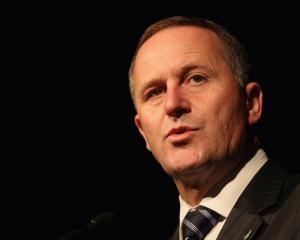The New Zealand dollar dived a third of a cent when the market reopened for the week, after Prime Minister John Key said a drop to the official cash rate would be useful.
The kiwi fell fast from around US73.80c against the greenback, where it was at the end of trading on Saturday, to near US73.40c. That was close to an 11-week low reached early on Saturday.
It was the second time in less than a week that comments from Mr Key were followed by a rapid decline in the NZ dollar.
Last Wednesday, Mr Key said the market had priced in a cut to the OCR and it "would probably be my expectation, that the Reserve Bank would cut".
Many economists are expecting Reserve Bank Governor Alan Bollard to cut the OCR from 3 percent to 2.5 percent on Thursday in response to the devastating earthquake in Christchurch on February 22.
The kiwi also dived to around A72.50c against the Australian dollar about 8am -- its lowest level in 18-1/2 years -- having been around A72.80c when the market closed on Saturday.
The NZ dollar hit a 10-1/2-month low against the European currency, around 0.5250 euro by 8am, from 0.5284 at 5pm on Friday, with the kiwi also down to 60.47 yen from 60.76. The trade weighted index fell to 64.72 at 8am today from 65.07 at 5pm on Friday.
The US dollar eased to a four-month low against major currencies at the end of last week and looked set to extend losses after a solid US February jobs report did little to alter expectations for Federal Reserve monetary policy.
The euro broke above the psychologically important $US1.40 level and headed for its biggest weekly rise in six weeks, after European Central Bank President Jean-Claude Trichet hinted earlier at an April interest rate rise.
Nonfarm payrolls increased 192,000 in February, topping forecasts of 185,000 jobs. The unemployment rate dipped to 8.9 percent, the lowest since April 2009, compared with 9 percent in January.
While the data sent a strong signal the US labour market recovery has become self-sustaining, analysts said the number was still close to forecasts, disappointing investors who had hoped for an even stronger report.






